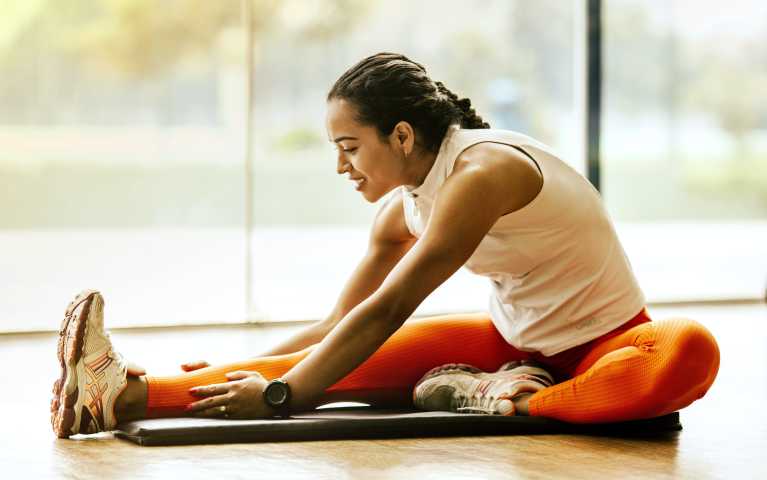
Quality sleep can help you boost your workout game, while poor sleep increases the risk of injury during exercise.
Most athletes know their bodies need rest days to recover from tough workouts.
But what many don't realize is that they also need a good night's sleep – not only to get ready for another workout, but to help their muscles recover overnight!
According to a 2020 study in Med Sci Sports, “Effects of sleep deprivation on acute skeletal muscle recovery after exercise," sleep deprivation modifies inflammatory and hormonal responses, which can affect muscle recovery.
“Sleep is considered essential for muscle recovery, mainly due to its effect on hormone secretion," the study finds. Total or partial sleep deprivation “is known to alter not only blood hormones but also cytokines that might be related to skeletal muscle recovery."
Why Sleep Is So Important
One of the theories on why we sleep is that it's a restorative process for the body, says Dr. Peter Polos, MD, PhD, FCCP, FAASM, a sleep medicine specialist and sleep expert for Sleep Number.
According to Dr. Polos, sleep is not only restorative for memory consolidation and a cleansing process for the brain, but it's for the body too.
“As the body goes through daily activities, sleep is the time to repair and refresh the body," Dr. Polos says.
Athletes who work out strenuously have “clearly taxed the body and need more time to recover and restore," he says.
How Exercise Affects Our Bodies
Strenuous exercise causes inflammation in the muscles, Dr. Polos points out. Sleep can clear those inflammatory mediators.
A recent study in the journal Exercise Physiology concluded that “intense long exercise can lead, in general, to higher levels of inflammatory mediators," and might increase the risk of injury and chronic inflammation.
On the other hand, “moderate exercise or vigorous exercise with appropriate resting periods can achieve maximum benefit."
That means exercise needs adequate rest to be beneficial.
How Sleep Prepares the Body for Working Out
Sleep can prepare the body in a number of ways. Post-exercise, there are metabolic activities that occur while sleeping that help the body for the next day, Dr. Polos says.
“There are changes in fat metabolism associated with sleep. "
During sleep, the body releases a growth hormone that's crucial to muscle development and muscle repair, Dr. Polos says. “So having adequate time for sleep allows for adequate release of the hormone."
The growth hormone – the same one responsible for growing our height when we're younger – works on the muscles when we stop growing, he says.
“Once those growth ages have ceased, the growth hormone still functions in muscle development and muscle repair."
Sleep, he says, can better prepare you for your activities or potential immune needs the next day.
The Relationship Between Sleep and Exercise
Sleep and exercise influence each other “through complex, bilateral interactions that involve multiple physiological and psychological pathways," finds the study, Sleep and exercise: A reciprocal issue?
Normally, exercise is highly beneficial to sleep — but of course it depends on your age, your sex, your fitness level and the characteristics of the exercise (how intense, what time of day, the duration, etc.), the study found.
When we're talking about how sleep helps muscle restoration, remember, the sleep must be “good, restorative and a sufficient quantity of sleep," Dr. Polos says.
Bad Sleep Can Lead to Bad Recovery and Higher Risks
Just like you need a good night's sleep to aid in muscle recovery, sleep disturbances can impair a person's ability to exercise “and increase the risk of exercise-induced injuries either during extreme and/or prolonged exercise or during team sports," found the study, Sleep and exercise: A reciprocal issue?
If you don't allow proper recovery and muscle repair and then you tax those same muscles groups the next day or two, without that proper repair, you're at greater risk for injury, Dr. Polos says.
“You are at risk for a poor performance because you've not had the opportunity to restore to baseline, or maybe even to restore to above baseline, which is the whole point of working out," he says.
Poor sleep has an impact on cognition, alertness and reaction time, “all of which are very important to an athlete," he says.
Sleep Affects Everyday Athletes, Too
This doesn't just apply to professional athletes, but anyone exercising. It could just be your Saturday tennis or basketball game.
“If your mind has not had adequate amount of sleep, reaction time decreases," Dr. Polos says.
“Your mind has to be locked into what it is that you're doing. And [...] if your mind is sleep deprived, it's trying to process at a reduced efficiency," he says, describing a sleep-deprived, overloaded mind trying to process the physical and mental demands of the game while trying to fight the body's urge to get some sleep — of course that will affect your reaction time.
Dr. Polos noted that studies have shown that reduced reaction time is also associated with greater injury rates in college and professional athletes.
“You can avoid an injury if you have normal reaction time," he said.
How to Coordinate Your Workout and Your Sleep
Everyone agrees that physical activity is good. But what should you do if you're sleep deprived?
Dr. Polos says, "First assure you get normal sleep and then pursue your workout."
Like diet and exercise, quality sleep is essential for optimal wellbeing and performance. Because everyone's sleep needs are different, Sleep Number® smart beds sense your movements and automatically adjust firmness, comfort and support to keep you both sleeping comfortably. Find your Sleep Number® setting for your best possible night's sleep, and if you own a Sleep Number® bed, log in to your Sleep Number® Rewards account to see your exclusive offers, refer friends and more.